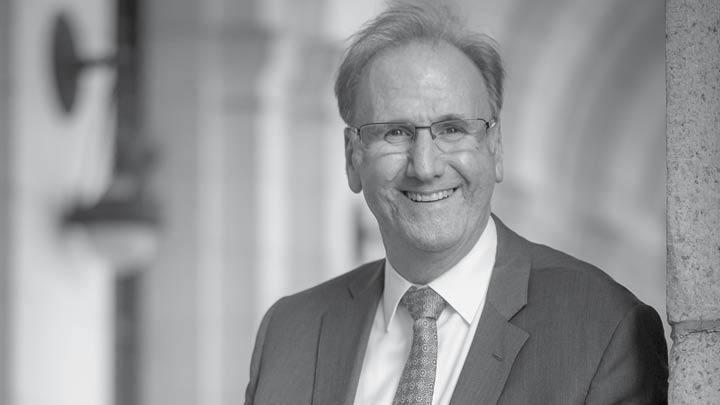‘Secret’ agent of renewal

Before applying for a job with the CIA, Peter Kiemel’s knowledge of the organiza- tion was mostly what he had garnered from spy novels.
“I knew nothing about analyses at the CIA,” he said. “It wasn’t even on my radar screen.”
Following an interview with a recruiter for the agency in 1988 on the University of Illinois campus, where Kiemel was in graduate school, his career goals quickly materialized: “I knew it was exactly what I wanted to do,” he said.
“It was fortuitous that I had the right skill set and language skills for the job,” said Kiemel, who had recently spent a year studying Russian.
STRATEGIC ANALYSIS
For more than three decades, Kiemel has worked in strategic analysis, serving as a bridge between the intelligence and policy communities. He has briefed presidents, vice presidents, leaders of Congress, and Senate and House committees on some of the nation’s most pressing national security concerns.
It was in Professor Dirk Jellema’s Russian history class—a long way from the floor of Congress that Kiemel’s interest in studying the Soviet Union was piqued.
“It was during this time that Brezhnev died, and there were all these questions about the succession process and the implications of that,” said Kiemel. “I was fascinated by all of the Soviet news.”
An interim trip to the United Nations with political science professor Robert DeVries solidified Kiemel’s interest in international affairs.
Kiemel has spent the majority of his career analyzing the former Soviet Union and Eurasia and eventually the Middle East and Europe, based on intelligence gathered by the agency.
“I have seen firsthand how policy is made and how things that the CIA produces impacts policy decision making,” he said. “The role of the CIA is to speak truth to power. We have no stake in the policy fights. Our role is to give realistic assessments of what is going on in the world and how decisions regarding policies would affect U.S. interests.”
Kiemel said his Calvin education definitely impacted his work. “Calvin taught me how to think about the world—that as a Christian, there isn’t just one way to think about things,” he said.
THINKING DEEPLY
“Thinking deeply is essential in intelligence analysis; you need to go beyond the obvious and think about all of the potential outcomes. That kind of thinking is exactly what is needed to succeed in intelligence analysis.”
In addition, Kiemel’s faith has challenged him to delve even deeper, he said. “To love God, we need to love our neighbor, and in order to do that we need to understand our neighbor. We need to understand our neighbor’s history and culture and politics.
“It’s not just studying about Russia or the Middle East,” he said. “It’s studying with purpose to help your neighbor. It’s about advancing U.S. interests but also about how to make the world a better place.”
Following his first job as a Soviet analyst, Kiemel has held numerous leadership roles within the agency throughout his tenure. His most recent is as director of the Intelligence Language Institute, the CIA’s premier language school for training its global workforce.
Whether analyzing data on climate change, militarism abroad, autocracies, even the pandemic, Kiemel has found his work revolves around justice.
“Gathering the data and analyzing it in order to warn people about these threats and help to deter them is about advancing justice and contributing to renewal,” he said.
He added with a laugh: “I do see myself as an agent of renewal, or maybe a ‘secret agent’ of renewal in my case.”






